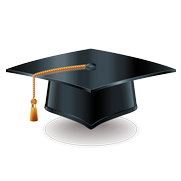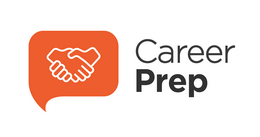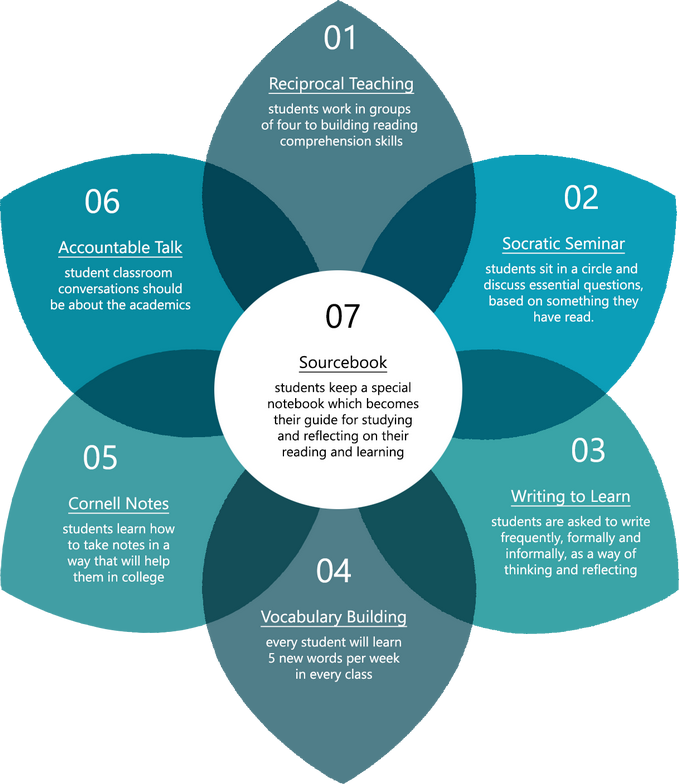ACADEMICS AT CHEC
PROGRAM OF STUDY / SELECT OFFERINGS / CHEC 7 / ASSESSMENT / WORLD CULTURES / LANGUAGES / SPECIAL EDUCATION / STEM / ARTS / TECHNOLOGY /
PROGRAM OF STUDY
Columbia Heights Educational Campus is a unique globally themed bilingual campus that serves grades 6 through 12 and prepares all of its students for success in college and the careers. CHEC has been recognized as one of the top schools in the area and country on the Advanced Placement Challenge Index for offering Advanced Placement to all students. It also has the only Spanish language dual immersion high school program in Washington, DC. Students can take a full bilingual program through the 12th grade. CHEC students come from over 50 countries and we use this diversity to complement our globally themed curriculum. Every grade explores a global theme, which ties together their learning and builds their global awareness.
Beginning in middle school, all students become articulate communicators in English and Spanish through our dual language immersion program. The middle school also develops the students' full potential through music and visual art for all students. In the eighth grade, students can transition early to high school by taking high school courses for credit, and in high school as early as the ninth grade, students can take college courses for both high school and college credit through our early college program. Once in high school, students can choose one of two career paths, Math, Science and Business, or Multilingual Communication and the Arts. In addition to Spanish, students can take French, Italian, or Arabic. Students are engaged in exploration and inquiry through our project based learning and portfolio assessment process. All students collect their work for all classes and present it to their classmates, teachers and parents in a portfolio presentation process. CHEC has a full athletic program at both the middle school and high school level with a variety of sports for boys and girls. In addition to athletics, there are numerous clubs and extracurricular activities. CHEC offers a globally themed after school program which includes both academics and enrichment. We are also a Flamboyan Parent Partnership School and conduct home visits for all parents who wish to participate.
CHEC is a standards-based school, which means that standards have been set for teacher performance, principal performance, and student performance. The academic standards set for students include what students should know and be able to do at each grade level. World Cultures/Global themes are intended to integrate culture, global studies and the standard curriculum. Curriculum is designed so that students can develop their learning through the lenses of rigor, relevance and social justice.
CONTENT STANDARDS describe what students should know and be able to do in each subject. This year we will utilize the Common Core State Standards.
PERFORMANCE STANDARDS indicate the kind of task a student must perform (such as writing an essay, completing an exam, conducting a scientific experiment) and the quality of student performance that is acceptable to show the content standards have been met.
SELECT OFFERINGS
ADVANCED PLACEMENT:

- Biology
- Calculus
- Chemistry
- Computer Science
- Computer Science Principles
- English Language
- English Literature
- French Language
- Italian Language
- Music Theory
- Physics
- Spanish Language
- Spanish Literature
- Statistics
- Studio Art: 2-D Design
- Studio Art: 3-D Design
- US Government
- Politics
- US History
FACULTY AND STAFF

- 4 Ph.Ds
- 94 Masters Degrees
- 30 Bachelors Degrees
- 6 Associates Degrees
CAREER PREP:

- Carpentry
- Cosmetology
- Pre-engineering
- Hospitality Management
SPECIAL PROGRAMS:

- Advanced Placement for All
- Blended Learning Program
- Early College Program
- Early High School for Middle Schoolers
- Extended Day Program
- National Honor Society
- NJROTC
- Robotics Club
- Urban Debate League
- Future Business Leaders of America
- Read 180
GLOBAL EDUCATION

- World Language courses: Arabic, French, Italian, Mandarin Chinese, Spanish (dual immersion).
- Student exchanges: Brazil, China, Haiti, Guatemala, Indonesia, Italy, Mexico, Paraguay and The Bahamas.
MCIP PROGRAMS:

- After School Program
- Early Childhood Center
- Scholarship Gala
- Study Abroad Program
- Teacher Training Institute
- Teen Pregnancy Prevention
- Youth Development
- Summer School
DEMOGRAPHICS

- 708: Female
- 702: Male
- 61% Hispanic/Latino
- 34% African-American/Black
- 3% Multi-ethnic
- 1% Asian
- 1% White
CHEC 7 STRATEGIES
Our goal is to provide the highest quality instruction possible, so that every student is motivated to learn, experiences rigor that will prepare him or her for college, and is supported in areas where he or she needs it. Every classroom is a community of learners, and as a school we have chosen instructional strategies that will make sure that every student can develop to the highest level. In all of your classrooms, you should experience the following instructional strategies:

1. Reciprocal Teaching: Reciprocal Teaching is a strategy for building reading comprehension and source investigation skills. Focusing on a central question or “zinger question,” students work in groups of four (pairs and individual work are also effective) in which each person takes on a role of a successful reader. The roles include a summarizer who identifies and condenses the most important points of a text; a questioner who formulates questions about the text; a clarifier who makes sense of confusing text by looking up vocabulary, concepts, or unclear references; a predictor who uses information to look to the future. Students read and annotate using their role, and then discuss sections of the text for meaning with regard to the central question. The immediate goal of Reciprocal Teaching is academic discussion about a critical text or source. The long term goal of Reciprocal Teaching is to build students’ skills as readers and investigators. http://www.readingrockets.org/strategies/reciprocal_teaching
4. Vocabulary Building: Like writing to learn, vocabulary building can occur in many different ways. At the core, however, should be a process of making predications about the meaning of the word; examining its definitions in different contexts; exploring relevant prefixes, suffixes, and Greek or Latin roots; using the vocabulary in different ways such as writing and discussion; and being able to show mastery of the word through assessment. Some successful vocabulary strategies include concept maps, kinesthetic activities, word webs, PAVE, visualization drawing, acting out words, and accountable talk. Marzano has provided a framework for the best ways to increase reading achievement and content mastery by explicit vocabulary instruction grounded in the content or unit of study (see file cabinet). http://www.u-46.org/roadmap/files/vocabulary/acadvoc-over.pdf
5. Cornell Notes: Cornell notes combine the skills of note-making and note-taking through a process which engages students in direct instruction, individual work, group work, and meta-cognition. Students split their paper into a right and left side. The right side is reserved for information given to students by a teacher or a text—the words are not their own. The left side is reserved for their thoughts, such as theme-based, connective questions, clarifying questions, and detail questions about content, connections the student can make to him or herself, summary statements, or pictures which represent the material on the right. Students practice meta-cognition when they fill in the left side because if they are unable to form questions, make connections, write a summary, or draw picture, then they are struggling with comprehension of the material. Cornell notes also provide students with great study aides as they can fold the paper and ask themselves the questions on the left to quiz their own mastery. The goal of Cornell notes is to teach the habits of mind necessary for college-level comprehension of lecture-based courses, as well as to empower students to take their learning into their own hands and monitor their understanding. http://lsc.sas.cornell.edu/Sidebars/Study_Skills_Resources/cornellsystem.pdf
6. Accountable Talk: Accountable talk integrates the discussion basics of Socratic Seminar with vocabulary building to encourage the use of academic vocabulary in the context of conversations. Often accountable talk becomes part of a class through activities such as “think, pair, share,” allowing students to integrate new words into their working vocabularies. The “accountable” aspect of accountable talk is often found in tracking word usage during discussion and setting goals for word usage. Students will set personal or group goals, and then track their and others’ word usage to ensure they are practicing their academic vocabularies. The goal of accountable talk is to integrate new words into students’ everyday academic vocabularies. http://wordgeneration.org/atbigpic.html http://www.cse.ucla.edu/products/reports/r670.pdf
7. New American Literature: New American Lecture is a strategic way of lecturing. The strategy is designed to answer two questions: (1) What does direct instruction look like when applied to the teaching of declarative content rather than the development of procedures and skills? (2) How can incorporating what current brain research tells us about how to make information memorable improve the classic lecture format? In developing and implementing a New American Lecture, the teacher provides students with five kinds of support:
- To connect the learner to past knowledge and to build new connections, the teacher designs an activity that hooks students into the content and a bridge that links students' initial ideas to the content to come.
- To organize and teach students how to collect information, the teacher provides students with a visual organizer that lays out the structure of the lecture content.
- To increase involvement and make content memorable, the teacher uses memory devices and active participation techniques.
- To help students process and integrate the information, the teacher conducts periodic thinking reviews.
- To help students apply and evaluate their learning, the teacher provides synthesis and reflection activities.
ASSESSMENT AT CHEC
Assessment provides students, parents and teachers with important information on where a student is progressing, and where he or she needs to focus more. At CHEC we use different kinds of assessments, formal and informal, to help guide students learning. We expect students to become familiar with the different assessments, and to keep an updated assessment passport order to track their progress and improve upon it.
RUBRICS - are designed by teachers and provide a clear, objective understanding of what is required to meet any given standard. Rubrics are descriptions of what is required to meet the standard when completing an assignment. Students must use rubrics to help them improve their work. At CHEC we have a culture of revision, so that all students get used to reviewing and revising their work. Work not meeting or exceeding the standards is returned to the student with commentary so that the student can revise the work to meet the standards.
PORTFOLIOS - another way in which the Columbia Heights Educational Campus measures student progress is through the use of portfolios in each class. A portfolio is a collection of students' work which demonstrates that they have met the Standards in that class. This collection includes the students' comments and analysis of why they feel this work demonstrates that they know the subject matter. The benefits of using portfolios for students include the opportunity for revision- whereby the students correct their work and deepen their understanding of the content. Students also benefit from the experience they gain in organizing and presenting their work and the pride they take in reviewing their own growth and accomplishments from each course.
All CHEC students are required to complete and present their portfolios at the end of the semester/year in all grades and all subject areas. This is a promotion requirement in grades 6 through 11, and a graduation requirement in grade 12. Each advisory the student is required to complete authentic portfolio products and to demonstrate how the projects obtain the rating of meets or exceeds standards through an oral presentation of his or her portfolio before a panel of parents, teachers, community advocates or students. The student earns 40% of their grade through successful completion and defense of their portfolio. The portfolio is a requirement for all CHEC students including those who transfer in after the beginning of the year.
STANDARDIZED TESTING - All students (grades 6-10) in the District of Columbia Public Schools must take a standardized test every spring. This test measures basic skills in reading and math. While it is not the only way to tell how well a student is doing in school, it is an important measure of progress. The PARCC (Partnership for Assessment of Readiness for College and Careers) assessment has five performance levels: Level 1 indicates an area of greatest need and Level 5 indicates the strongest performance. This information is used to personalize instruction for students.
All CHEC classes teach the skills necessary to do well on the standardized test. The school requires attendance at after school and Saturday tutoring for those who have not yet reached the proficiency level for their grade. It is each student’s responsibility to take this test seriously, and to take advantage of the extra help available so they can improve their scores every year.
ASSESSMENT OF ENGLISH LANGUAGE LEARNERS - In order to assess how well English Language Learners are progressing, all students with a language other than English in the home, who have not yet achieved English language proficiency, must take the ACCESS for ELLs test every spring. This test is used to determine if students are ready to exit the ESL program.
PRELIMINARY SCHOLASTIST APTITUDE TEST (PSAT) - This is a standardized test that provides feedback on how ready a student is for college level work. It prepares students to take the SAT. The PSAT is taken in October, and all 9th, 10th, and 11th graders must take the test. Selected 8th grade students also take the test. Students who score high on the PSAT are eligible for the National Merit Scholarship Program.
SCHOLASTIC APTITUDE TEST (SAT) - The SAT is required by most colleges and universities, and is used as criteria to determine both admission and merit scholarships. Students must take the SAT in the spring of their Junior Year, and the fall of their Senior Year. It is important for students to prepare for the SAT both in school, as well as outside of school. Students should purchase their own SAT preparation book, in order to improve their scores by studying and preparing outside of school hours.
ADVANCED PLACEMENT (AP) - The Advanced Placement (AP) program is a curriculum sponsored by the College Board which offers standardized courses to high school students that are generally recognized to be equivalent to undergraduate courses in college. Participating colleges grant credit to students who obtained high enough scores on the exams to qualify.
WORLD CULTURES PROGRAM
CHEC students will investigate the world, recognize and respect different perspectives, communicate ideas in more than one language, and be proactive in taking action as global citizens.
In alignment with the mission of CHEC, the mission of the World Cultures program is to prepare students to be active participants in an ever-shrinking and increasingly interdependent globe. We prepare our students for this global interdependence by developing their literacy in global matters, multi-culturalism and cultural diversity, as well as helping them achieve a formidable level of proficiency in a world language other than English. We also aim to help Heritage speakers maintain and develop their native language skills. More than ever people, cultures, and nations are interdependent, requiring the preparation of students capable and disposed to solving problems on a global scale, and ready to participate effectively in a global economic and civic environment. All of our students are impacted instructionally by this global value system in the following ways:
GLOBAL THEMES BY GRADE LEVEL
- 6th Grade - Migration and Immigration
- 7th Grade - Conflict
- 8th Grade - Identity, Voice and Gender
- 9th Grade - Change, Progress and Innovation: What is progress and Innovation? Can it go too far?
- 10th Grade - Knowledge, Learning, Education and Wisdom: What is Knowledge, Learning, Education, and Wisdom? To whom is this accessible? How?
- 11th Grade - Equity and Power: What is Equity? What is Inequity? Where do we find inequity and why? Who has power and who is fighting for it and why?
- 12th Grade - Global Economics: How are economics and power interrelated? What is a global economy?
DUAL AND WORLD LANGUAGES
Thank you for your interest in our Dual and World Language Program at Columbia Heights Education Campus. We offer numerous opportunities for our students to be exposed to various cultures and languages.
MIDDLE SCHOOL - Our middle school Dual Immersion Program enriches the education of our 6th-8th grade students by offering Spanish-language content courses in Science, History, and Spanish Language Arts. This unique experience allows students to be completely immersed in the target language. In order to support our students, all middle school students are enrolled in Duolingo, a language learning app, which allows them to develop foundational language skills in Spanish. Introductory students also receive an additional Spanish support class which covers the basics of Spanish and also serves as a bridge to the Spanish-language content subject area courses, with the goal of further developing reading, writing, listening and speaking skills in Spanish. In addition, our program provides emerging bilinguals with a personalized learning experience through our Summit Learning blended learning platform. Our talented team have developed a curriculum accessible through the platform, which allows students to learn content and skills in Spanish at their own pace. Moreover, at the end of the 8th grade our students have the opportunity to take the AP Spanish exam in preparation for high school and also to make them eligible to earn college credits.
HIGH SCHOOL - The 9th-12th grade high school program offers an exceptional opportunity to further our students’ passion for learning Spanish through The Dual Language Academy. High school students are able to join the program as a continuation of their immersion experience in the middle school. Students take Spanish-language versions of History, Science, Spanish Language Arts, AP Spanish Language and Culture, and AP Spanish Literature. Students who successfully complete all the courses and DCPS Seal of Biliteracy requirements, are candidates to receive the Seal of Biliteracy upon high school graduation. Students also have the option to learn other languages. The high school world language program offers Italian, Portuguese, Chinese, Arabic, Japanese, French and Spanish. We offered seven languages that students can choose to complete language requirements for graduation and enhance their academic career.
SPECIAL EDUCATION
The mission of the SPED Program at CHEC stresses equal access for all, academic success, and life skills
SPED Program Mission Statement
The Special Education Program at CHEC treasures the success of all students in a inclusion setting. All students should have the opportunity to demonstrate their abilities through accessing the general education curriculum with their peers. The Program strives to ensure that reasonable accommodations, including the selective use of resource instruction, are applied to align with grade level standards and the CHEC pedagogical strategies. The Program advocates for all students to have a smooth transition to their post-secondary education and employment in the workforce. Thus, a central aspect of our work is to ensure that all students are taught appropriate life, social, and emotional management skills in all phases of their experience at CHEC.
As part of the CHEC professional learning community, the SPED program provides resources to colleagues in the general education departments through a range of modalities.
Special Education Program Core Beliefs
- Reasonable Accommodations must be adhered to across all content areas’
- CHEC Special Education students will have full access to the general education curriculum
- Special Education teachers will be a resource for general education teachers regarding specialized instruction, differentiation, and modifications for our students
- We strive to teach our students through a variety of modalities to ensure a maximum level of understanding
- We provide all students with the appropriate tools to manage their social/emotional wellbeing
- Our ultimate goal is to make students become self-sufficient in their ability to advocate for their individual needs in life.
- All students should be given the opportunity to exit the program
- All students will be given an opportunity to enter College or the workforce
- All students will have the opportunity to participate and explore various post-secondary destinations
- We strive to increase all students’ participation include clubs outside the sports arena.
SPED services are civil rights protected by the Individuals with Disabilities Education Act (IDEA); compliance is the law.
SCIENCE TECHNOLOGY ENGINEERING AND MATH (STEM)
Thinking of a career as a coder, game developer, designer, or robotics engineer? Then start with the experience of an excellent program like CHEC'S STEM related offerings. In an ever-changing, increasingly complex world, it's more important than ever that we as a country can produce students that are prepared to bring knowledge and skills to solve problems, make sense of information, and know how to gather and evaluate evidence to make decisions. STEM is all about exploring, creating, building, and making things better, and at our STEM program, you’ll do just that. You’ll work with students from all over the District and even the world as you test your problem-solving, creativity, and collaboration skills.
CHEC offers a rigorous, hands-on curriculum designed to help develop students’ problem solving abilities and prepare them for college-level science classes. Starting in 9th grade, students take Biology I where they are introduced to the microscopic world. From there most students will progress into Chemistry I and on to their choice of Anatomy & Physiology, Physics I, and/or Environmental Science. Many students will elect to take advantage of our AP offerings and study AP Physics I or AP Biology. CHEC has a tight-knit STEM department that pride itself on their ability to work as a unit. Course curricula are discussed weekly to ensure the proper level of rigor and alignment from one course to the next.
ARTS
Thinking of a career as a coder, game developer, designer, or robotics engineer? Then start with the experience of a world-class program like CHEC'S STEM Program. STEM is all about exploring, creating, building, and making things better, and at our STEM program, you’ll do just that. You’ll work with students from all over the District and even the world as you test your problem-solving, creativity, and collaboration skills.
CHEC offers a rigorous, hands-on curriculum designed to help develop students’ problem solving abilities and prepare them for college-level science classes. Starting in 9th grade, students take Biology I where they are introduced to the microscopic world. From there most students will progress into Chemistry I and on to their choice of Anatomy & Physiology, Physics I, and/or Environmental Science. Many students will elect to take advantage of our AP offerings and study AP Physics I or AP Biology.
TECHNOLOGY
Thinking of a career as a coder, game developer, designer, or robotics engineer? Then start with the experience of a world-class program like CHEC'S STEM Program. STEM is all about exploring, creating, building, and making things better, and at our STEM program, you’ll do just that. You’ll work with students from all over the District and even the world as you test your problem-solving, creativity, and collaboration skills.
CHEC offers a rigorous, hands-on curriculum designed to help develop students’ problem solving abilities and prepare them for college-level science classes. Starting in 9th grade, students take Biology I where they are introduced to the microscopic world. From there most students will progress into Chemistry I and on to their choice of Anatomy & Physiology, Physics I, and/or Environmental Science. Many students will elect to take advantage of our AP offerings and study AP Physics I or AP Biology.
